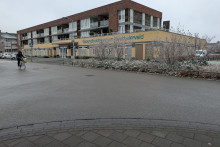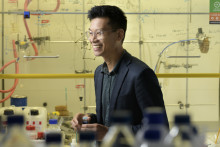Can you explain the main goal of the research?
Anthonj: ‘The research project focused on WASH - water, sanitation and hygiene – among people experiencing homelessness in high-income countries in Europe. The main goal was to understand the challenges homeless people face, and how climate change and extreme weather events impact their access to WASH. We wanted to determine the main problems, as well as suitable methods to study this topic. Last but not least, we wanted to co-create solutions to these challenges. What made the project really unique is that we directly involved homeless people as co-researchers.
Carmen Anthonj
Carmen Anthonj is an Assistant Professor of Water, Health and Decisions at ITC Faculty of the University of Twente. She investigates how WASH - water, sanitation and hygiene - infrastructure and behaviours can promote human health and how they can impair human health. Among other topics, she studies how WASH can prevent water-related infectious diseases, and how the WASH situation differs in different regions and among different populations. Her research project ‘Climate-resilient WASH for those left behind in cities’ was conducted in 2023 in Bonn, Germany, and was made possible thanks to the Faculty ITC Blue Sky funding reserved for ‘high risk, high gain’ research.
We expected that the access to WASH for homeless people was absolutely insufficient. However, there was no scientific research into this topic before. Nobody has studied it, certainly not in Germany. Research directly involving homeless people is not done often because it is very difficult to gain access to this segment of population.’
Why was it important for you to look into this topic?
‘This was always something that interested me. I can’t walk past someone asking for help. I was raised to share, aware that because we are very lucky to have food on our table and a roof over our heads. In Germany, where I’m from, I used to volunteer with the charity organisation Caritas that provides welfare services, and also with soup kitchens serving people in need. There I met many people who were homeless or just one misstep away from being homeless.
Moreover, as part of my research, I have worked with vulnerable communities in the Global South, and I realized that there was a huge knowledge gap when it comes to these groups in the Global North. We generally don’t focus on high-income countries. In Europe, we generally have welfare systems, so we don’t always realize that there are people who still live in extreme poverty here.’
How did you conduct the research?
‘I decided to do the study in Bonn where I already had established connections with local NGOs. I was the one to conduct all the interviews, and so it was also important to be in a place I knew and where I spoke the language. I worked directly with charity organisations and social workers in the city. Their role was crucial because through them I was able to gain access to the homeless people. But it wasn’t easy. I visited Bonn about twenty times during a few months, so I could talk to the people directly.’
What was this experience like? What type of reactions did you receive?
‘It’s a very dynamic population, and so it’s difficult to meet the same person twice. I went to meet them at common meeting places, such as the charity and the shelter, joined events such as free haircut afternoons, arts activities and so on.
Their reactions depended on the specific situation - the time of the day and week, before or after breakfast or lunch, on their substance use behaviour, whether they had access to the drugs or not. It was very complex research, I’d say.
In general, everyone I talked to had very strong and clear opinions on their problems related to WASH access. They were very unhappy and dissatisfied with the situation, but often not open to an official interview. They believed that an interview would not change their situation. Many people I met were also very shy and reluctant to partake, because they felt that they would not be able to contribute anything useful.’
How did you eventually gain their trust?
‘I was very visible. I went to Bonn many times, and I participated in, as well as hosted, different activities, such as art classes. Over time, more people became interested in participating, but we had to be very creative in how to engage them.
For example, we would join them during their usual activities, such as cleaning the streets. Every morning, there is a city cleaning activity for those who want to generate minimal income. I joined them in cleaning many times and had informal conversations with them. At first, I answered more questions than I raised. With this type of research, you need to take your time.’
What were the main topics you discussed with them and what was the most surprising outcome?
‘The focus was on what is needed – in terms of WASH. Many spend the whole day outdoors; shelters are usually only open for the night. They need a place to get clean water, go to the toilet, wash themselves, get clean clothes. And these have to be safe and warm places in case it rains, or during winter.
They told us that there were no good toilets they could use, and that they didn’t dare to enter restaurants or shopping malls, because other people looked at them, and treated them like garbage. That forces them to urinate and defecate outside. This is especially awful for women. If you are on your period, and you can’t use a toilet, that is just terrible. And if the police catch them peeing outside, they are fined. But because they cannot be easily reached, by the time a fine gets to them, it might be doubled. At times, the fees pile up and some people end up in prison – for peeing outside. I would never have imagined that was even possible.’
Can you summarize the main results of the study?
‘We found out that none of the WASH facilities available to homeless people complied with the Human Right to Water and Sanitation – not in terms of hygiene, accessibility, availability, or anything else. In Bonn, there are about 660 people sleeping rough. Yet, there is only one free toilet that is open around the clock, and this toilet is not hygienic. There were no basic supplies, such as toilet paper and soap.
In the city center, there are only two fountains with free drinking water, but those are only available in the summer. Because of this, people are forced to adapt and search for other solutions. They don’t dare to enter a shop or a restaurant, and so they often use water taps in graveyards, for example.’
How does climate change and extreme weather events impact homeless people?
‘There are climate action plans in place, but they do not account for homelessness. During heatwaves, there are water trucks providing water in the city, but this service is very irregular. Dehydration is a real danger for homeless people. Especially for those who suffer from substance abuse or drink alcohol because they dehydrate faster. I’ve been told that many people die due to the lack of clean water.’
Are the results of the study being used to improve the lives of homeless people?
‘The goal was to provide evidence of the problematic situation, to show what is missing, and how we can improve it. As co-researchers, the homeless people helped us identify what exactly is needed and where. Together we have come up with a list of short-term and long-term solutions. For instance, make agreements with shops and restaurants, so they allow homeless people to refill their water bottles or use the toilet. Open up existing infrastructure, such as swimming pools. Come up with a coupon system, which allows them to use paid toilets for free.
This week, on the 21st of March, I will present the findings to the Committee on Social Affairs, Migration and Health of the City of Bonn. This presentation is a really big deal – it is the biggest deal, in fact. This is the moment policy makers will see the evidence of this pressing problem, and solutions to tackle it. If you present the challenges on a silver platter, someone has to act. I have high hopes. I’ve done many things in my life, but this is the absolute highlight for me, because I feel that we can actually make a change.’








